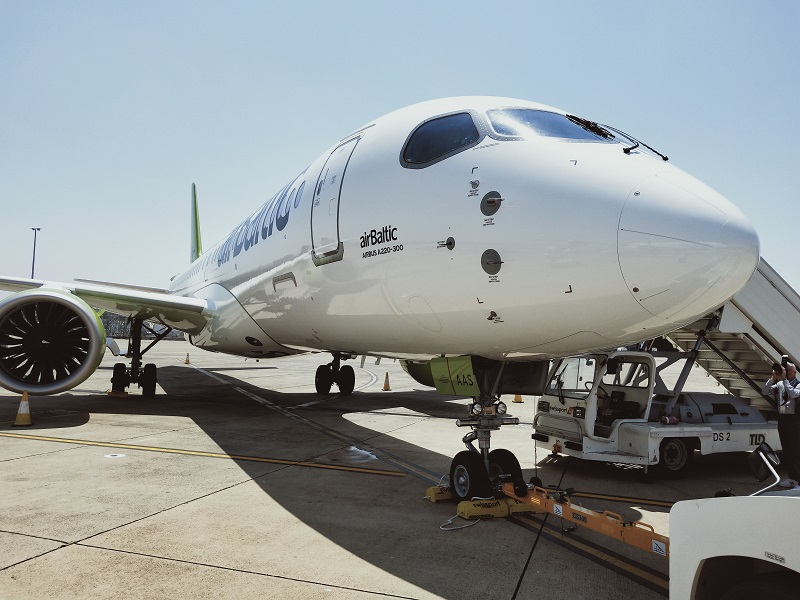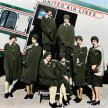Qantas plans to start the process of renewing its domestic fleet in 2020 but has yet to decide whether it will run one or two competitions.
Chief executive Alan Joyce ran his eye over an airBaltic Airbus A220 during a flight over Sydney Tuesday as the plane visited Australia as part of a Pacific promotional tour.
The fuel-efficient 100- to 150-seat A220, formerly the Bombardier C Series, can fly on routes of up 3400 nautical miles (6300km) and offers fuel savings of at least 20 percent.
It comes in two versions — the A220-300 taking part in the Pacific tour and the smaller A220-100 — and gets its increased fuel efficiency from the use of advanced materials, improved aerodynamics and Pratt & Whitney PW1000G geared turbofan engines.
READ: American claims first with flights to New Zealand’s South Island.
Air Vanuatu has recently signed up for four of the planes, which Airbus is pitching as suitable in Australia for lower density transcontinental routes, trans-Tasman operations and flights to the Pacific Islands.
Qantas has recently run its Project Sunrise competition for an ultra-long-haul aircraft and hopes to decide between Airbus’ A350-1000 and the Boeing 777X before the end of the year, subject to negotiations with its pilots’ union.
Once that is out of the way, Joyce said, it would look at the replacement of the Boeing 717, Fokker 100 and Boeing 737 jets used on its domestic routes and to transport workers in the resources industry.
One reason for that was that the Sunrise team would also be involved in assessing the domestic fleet replacements, he said.
The Qantas boss noted the airline had yet to make up its mind whether it would run a single competition involving Boeing and Airbus or break it up into two competitions with one for the 717s and F100s and the second for 737s.

Airbus took control of the C Series in 2018 and US rival Boeing is in the throes of taking over Brazilian regional jet maker Embraer, whose next-generation E-jets are the major competitor to the A220.
READ: Embraer’s superjet: will airlines choose heaven or hell?
That Boeing-Embraer deal was expected to be completed at the end of 2019 but a review by the European Commission delayed it until at least early next year.
Joyce said it would be helpful if the Boeing-Embraer issue was sorted because it would give Qantas a one-stop-shop for the entire domestic fleet replacement at each manufacturer.
Making the situation even more interesting, he noted, was Boeing’s plans for the New Midsize Airplane (NMA), already dubbed the 797, and when the US manufacturer will commit the to the project.
Qantas is looking at the 797 as a potential 737 replacement and possibly taking on the role of some Airbus A330s.
“So it’s a big decision, quite a complicated decision and there are a lot of moving parts in it,’’ Joyce said.
Asked whether he was confident, Boeing would proceed with the 797, he conceded he was not expecting a decision soon but was hopeful it would be made in time for the domestic fleet renewal.
“We, like a lot of airlines, are saying you’d be crazy not to do it, Boeing,’’ he said.
“We think it’s a fantastic aircraft on paper that looks good for what we want. And I think they’re hearing that quite a bit.
“But they have to get over the issues with the MAX, they have to get 777 certified, so they have a few issues they have to get over. “
Qantas is looking at the new aircraft arriving sometime in the mid-to-late 2020s.
Joyce pointed to aircraft availability and the fact the 737s were still performing “really well” as reasons for the timing.
“I mean we’ve gone through 12 years without an engine change typically on the 737s,’’ he said. “They’re very reliable, they have a high dispatch reliability on them.
“The 717s have been reliable as well and F100s are very low utilization so there’s no rush, we have a bit of time.”
Qantas has copped some criticism about the age of its fleet recently and Joyce said the airline usually took aircraft to the end of their life at 25 years but did not typically go past that.
With the 717s hitting the 20-year mark, he said they could “probably go a little longer but not much.”
“We’re not seeing them going into their 30 years of operation,’’ he said. “And the F100s are a bit different because of their low utilization. So they can go a little bit longer, but again there’s a limit to that.”
So what did the Qantas boss think about the A220?
He was impressed by the new aircraft and its spacious cabin, noting the bigger overhead bin space, the lower cabin noise and even the generously-sized toilet.
“To me, it looks like a very good aircraft,’’ he told reporters on the flight, “I think the passengers would love it.”
What Airbus had to get right, he said, was the price.
He noted the price of the aircraft had been high when it was the C Series, adding “for us to buy it, it has to be a lot cheaper than the prices we’ve been seeing out there.”
























